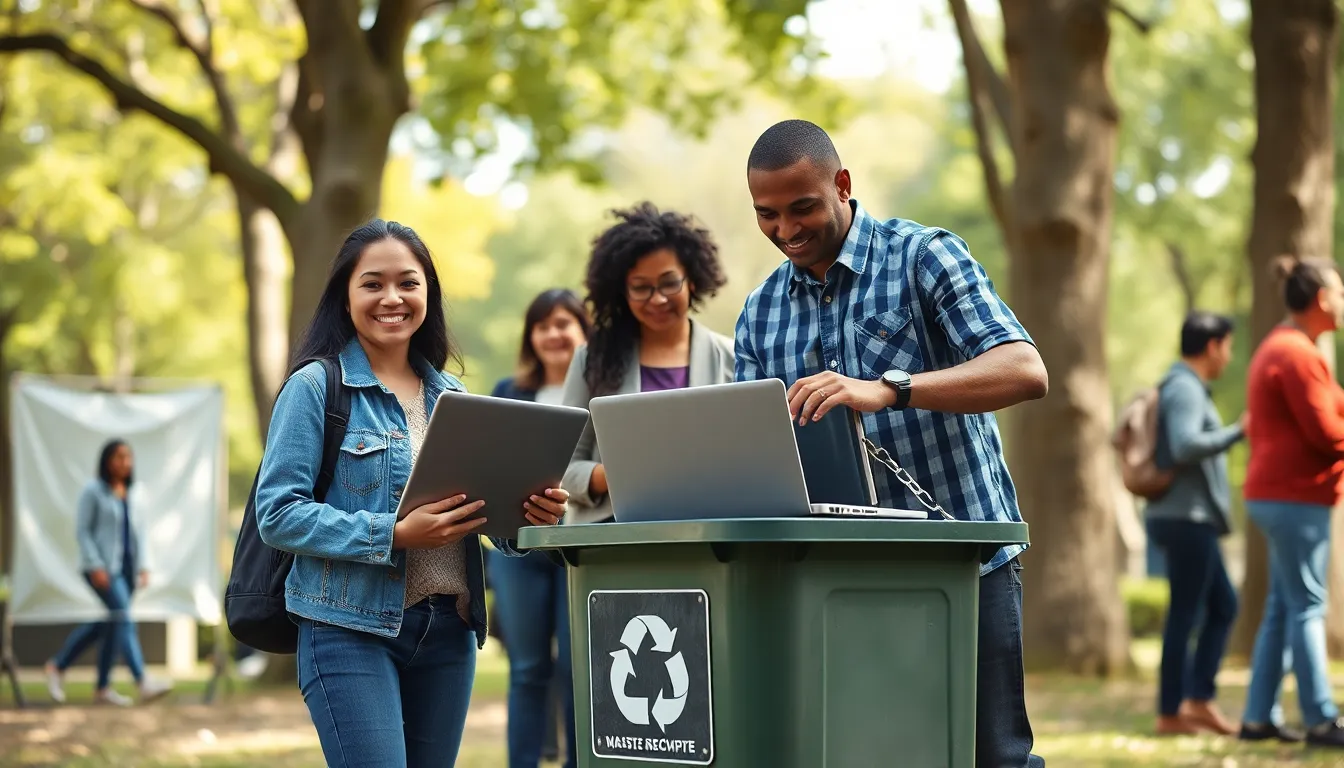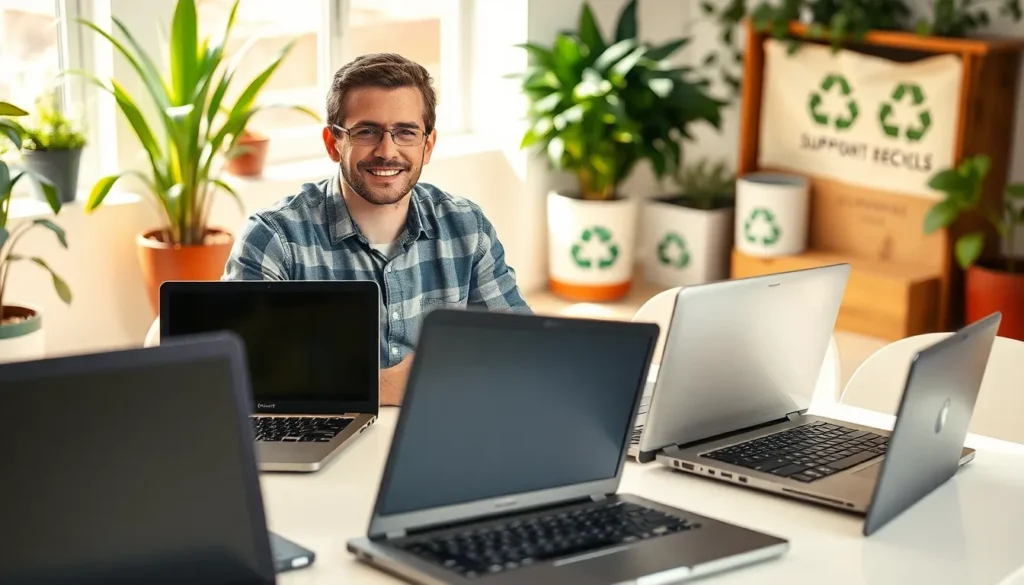Table of Contents
ToggleOld laptops can be like that one pair of jeans you can’t bear to throw away—full of memories but not quite functional anymore. Instead of letting them gather dust or become an accidental doorstop, it’s time to give them a proper send-off. Disposing of old laptops isn’t just about clearing space; it’s an opportunity to do something good for the planet and maybe even make a little cash in the process.
Understanding The Importance Of Proper Disposal
Disposing of old laptops properly is crucial for several reasons. Environmental impact remains a significant concern. E-waste contains harmful materials, such as lead and mercury, which can contaminate soil and water if not managed appropriately. Many local governments enforce strict regulations regarding electronic waste disposal, ensuring communities follow environmentally safe practices.
Data security serves as another critical factor. Laptops often store personal and sensitive information. If these devices are not wiped or disposed of securely, data breaches may occur, leading to identity theft or privacy violations. Employing secure data deletion methods before disposal is essential for preventing unauthorized access.
Financial benefits arise from responsible disposal as well. Reselling old laptops can generate income, especially if they remain functional or have valuable components. Many individuals and businesses seek refurbished laptops to save costs. Donations also provide a way to support community programs and educational initiatives, giving laptops a new lease on life.
Moreover, encouraging others to recycle electronics contributes to greater awareness about e-waste issues. Promoting proper disposal practices fosters a culture of sustainability. Engaging in conversations about the importance of recycling electronics inspires collective responsibility towards the environment and community welfare.
Proper disposal of old laptops plays a vital role in protecting the environment, ensuring data security, generating financial value, and encouraging sustainable practices. Adopting responsible disposal methods constitutes a step forward in addressing the challenges associated with electronic waste.
Options For Disposal

Disposing of old laptops involves various options that suit different needs. Evaluating these options helps ensure responsible disposal while potentially benefiting communities or the environment.
Donation To Charities
Many charities accept old laptops in working condition. By donating, individuals can support local programs that help students or low-income families gain access to technology. Some organizations refurbish donated laptops for educational use. Others recycle them into usable parts, aiding in the reduction of e-waste. Researching local charities makes it easy to find those aligned with specific community needs.
Recycling Programs
Recycling programs provide a sustainable solution for old laptops. Specialized e-waste recycling facilities accept devices containing hazardous materials. Many municipalities offer designated drop-off locations for electronic waste. Participating in these programs ensures that harmful substances are discarded safely. Often, these facilities recover valuable metals and plastics for reuse in manufacturing. Using such programs supports eco-friendly practices and reduces landfill contributions.
Trade-In Services
Trade-in services offer another practical disposal option. Various retailers and online platforms accept old laptops in exchange for store credit or cash. Individuals can check the terms and conditions for different programs to understand value. Many trade-in services require devices to be in working order. Receiving credits can offset the cost of new electronics, making it financially beneficial. Utilizing these services promotes recycling while providing financial incentives.
Preparing Your Laptop For Disposal
Before disposing of an old laptop, preparation is crucial for both protecting personal data and ensuring a smooth transition to a new device or disposal method.
Data Backup And Transfer
Backing up data prevents loss of important files. Users can employ cloud storage solutions like Google Drive or Dropbox for easy access across devices. External hard drives also offer reliable storage options. Once backed up, transferring files to a new laptop ensures a seamless experience when switching devices. New laptops often come with migration tools that streamline this process, making it easier for users to get started.
Data Wiping Techniques
Data wiping techniques remove sensitive information from the laptop. Simply deleting files is not enough, as they may still be recoverable. Specialized software, such as DBAN or Eraser, securely overwrites stored data, making recovery impossible. For users wanting extra protection, physically destroying the hard drive guarantees that data can’t be accessed again. Before opting for such methods, backing up necessary files remains essential to avoid unintentional loss.
Removing Personal Information
Removing personal information safeguards against data breaches. Logging out of accounts and deactivating services like iCloud or Google can reduce access to personal data. Furthermore, resetting the laptop to factory settings restores it to its original state. This step ensures all previous user data gets erased. Completing these actions prepares the laptop for recycling, donation, or resale, ultimately promoting responsible disposal of electronic devices.
Environmental Impact Of Improper Disposal
Improper disposal of old laptops leads to significant environmental harm. E-waste contains toxic substances, such as lead, mercury, and cadmium, which can leach into the soil and contaminate groundwater. Contaminated water sources affect not only ecosystems but also communities relying on these resources for drinking and agriculture.
Harmful materials present in e-waste contribute to air pollution when burned or incinerated. This process releases dangerous chemicals, which pose health risks to nearby populations. It’s essential to recognize that electronic waste is one of the fastest-growing waste streams globally, with projections estimating over 74 million metric tons of e-waste generated annually by 2030.
Neglecting proper disposal methods limits recycling efforts. A significant percentage of recyclable materials, such as metals and plastics, often end up in landfills due to poor disposal practices. By recycling laptops, individuals can recover valuable resources and reduce dependence on mining new materials, which further depletes natural resources.
Supporting sustainable practices benefits the planet. Engaging in responsible disposal can help initiate a circular economy, where old devices are repurposed and reused, reducing overall waste. Communities thrive when individuals contribute to environmental stewardship, creating a culture of sustainability.
Awareness about e-waste issues plays a critical role in fostering change. Educating individuals on disposal consequences and promoting recycling initiatives encourage responsible behavior. Ensuring the safe disposal of old laptops ultimately creates a healthier environment for everyone.
Disposing of old laptops is more than just a task; it’s a chance to make a positive impact. By choosing responsible disposal methods individuals not only declutter their spaces but also contribute to environmental protection and community support. Whether through donation recycling or trade-in programs each option offers benefits that extend beyond personal convenience.
Taking the time to securely erase personal data ensures peace of mind while promoting a culture of sustainability. As e-waste continues to rise proper disposal practices become increasingly vital. By making informed choices about old laptops everyone can play a part in creating a healthier planet for future generations.





